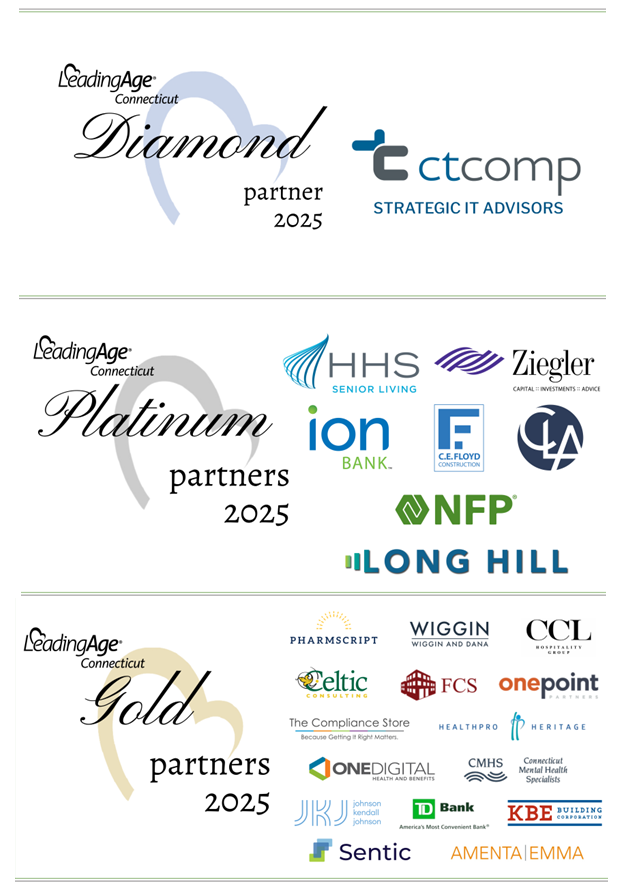Calendar of Events
|
Nurse Leadership Virtual Symposium
Wednesday, December 15, 2021, 10:00 AM - 3:15 PM EDT
Category: Events
Nurse Leadership Virtual Symposium
presented in conjunction with LeadingAge Iowa
Wednesday, December 15, 2021
10:00 AM - 3:15 PM LeadingAge Connecticut recognizes that workforce is likely the largest struggle that our members are facing today. These challenges often leave leaders feeling stressed, fatigued, and possibly burned out. In addition to a struggling workforce, nurse leaders are strapped with ensuring their staff are providing the safest, best quality care with the resident’s satisfaction being a large driver in future referrals of new residents.
LeadingAge Connecticut is please to partner with LeadingAge Iowa to offer you this Nurse Leadership Symposium and the sessions that we’ve lined up are geared towards the toughest challenges our members are facing today. We are very fortunate to have Cyndi Siders, an Executive Consultant with Siders HealthCare Consulting, discuss these issues and what our members need to provide a new “Culture” to their employees, coworkers, and residents.
We are hopeful that following the Nurse Leadership Symposium, participants will leave our virtual platform with a sense of empowerment to guide their leadership into focusing on recruitment and retention of staff they lead and establish a culture of safety and resident satisfaction that will ensure staff want to work for them and residents want to live in their organization.
10:00–11:15 a.m. Coaching Professionalism/Supporting Employee Engagement & Retention
Organizational and individual professionalism impacts resident and family trust, safety, quality of care, and satisfaction. Professionalism can also impact an organization’s reputation, market share, employee satisfaction, recruitment, retention, and engagement. Professionalism can be fostered and developed and should be considered a core competency for trusted health care delivery. Strategies for leading professionalism in daily practice will be explored.
Staff turnover is recognized as a significant risk factor in providing safe resident care. Managers that lead a culture of employee development, engagement, support, recognition, and appreciation are necessary in today’s environment. Providing effective feedback, supporting diversity and inclusion, and ideas to strengthen and maintain employee recruitment and retention will be discussed.
11:45 a.m.–1 p.m. How Nurses Support a Culture of Safety
Critical thinking, clinically pertinent assessment and problem solving, thoughtful delegation and resident-centered communication, and documentation are key elements of a culture of safety. Frequent nursing licensure and regulatory challenges include failure to appropriately assess, implement effective interventions, monitor, communicate, provide a safe environment, and facilitate coordinated transitions in care. This presentation will explore high-risk claim trends and contributing risk factors including situational awareness and critical thinking skills, communication and teamwork, leadership skills, delegation and supervision, and adverse event management.
1:00–2:00 p.m. Break
2:00–3:15 p.m. Service Excellence and Positive Messaging
Professional, courteous, informed care team members that are engaged, passionate, and proactive in meeting the needs of residents and family members… and that smile, have a sense of humor, are compassionate and empathetic, and live the values of the organization every day are the team members that bring service excellence to life. Strategies for developing and sustaining a culture of service excellence, setting expectations for daily service delivery, and mentoring staff that are not meeting service excellence expectations will be discussed.
The dreaded conversation or a difficult question … we have all been there. Communicating with heart and with an intent to understand the person’s need, concern or question requires active listening, acknowledgement, and focused action and follow-up. A culture of respect is the foundation of positive messaging. The core principles of positive messaging in daily communication, and when addressing challenging questions, concerns, and complaints will be addressed through story illustrations.
Registration Information:
Please contact LeadingAge Connecticut at 203-678-4477 or [email protected] with any questions. |

 Prev Month
Prev Month View Month
View Month Search
Search Go to Month
Go to Month Next Month
Next Month
 Export Event
Export Event 